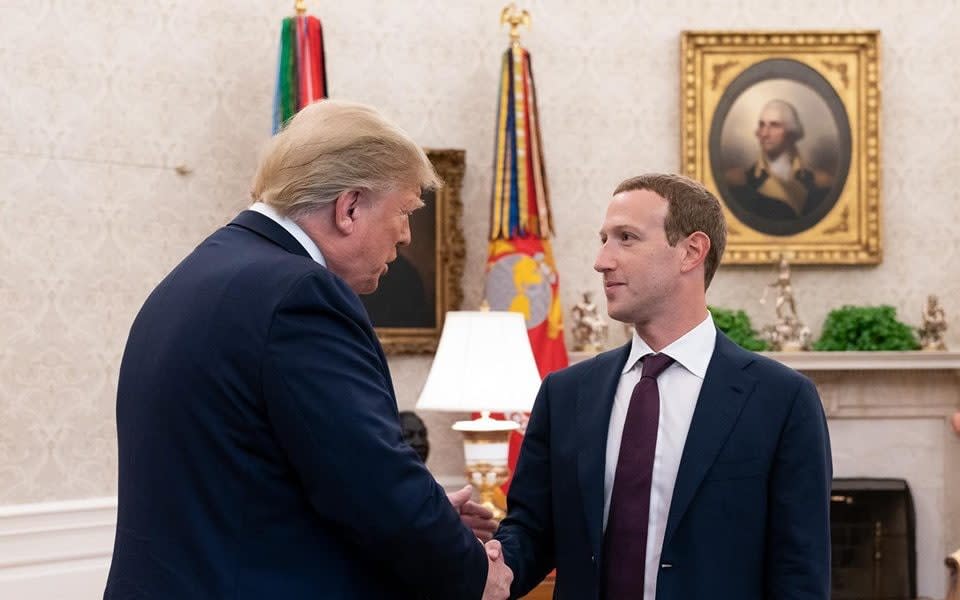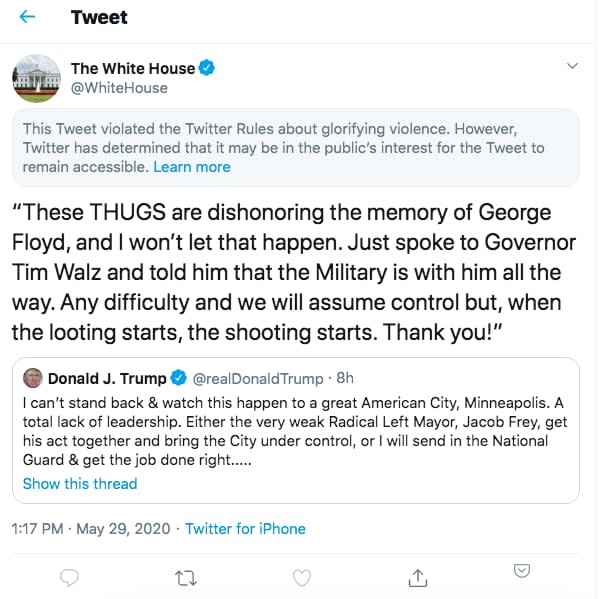Zuckerberg faces growing internal revolt at Facebook over how to handle Trump's posts
As violent protests spread across American cities following the death of George Floyd, some senior Facebook employees took to a rival social network - Twitter - to vent their frustration. The target of their anger? Their own company's policies towards inflammatory posts by President Donald Trump.
In a late-night post on Sunday, Facebook chief executive Mark Zuckerberg attempted to defuse the situation.
In a personal message, posted after 10pm California-time, Facebook’s billionaire founder hinted at the need for his social network to do more. “Facebook needs to do more to support equality and safety for the Black community through our platforms,” he wrote.
But Zuckerberg’s post, which included an announcement of a $10m (£8m) donation to racial justice organisations, failed to settle an increasingly bitter feud within the company over how the social network should deal with Donald Trump’s posts. It's a debate which looks set to only intensify as social media platforms gear up for what promises to be a long and visceral US presidential election campaign.

Indeed, Zuckerberg now faces an escalating crisis as a previously internal debate spills out into public view.
Last week, Twitter took the bold step of hiding a message posted by Donald Trump which it claimed had “glorified violence”.
Twitter’s decision to hide the post, which included the phrase “when the looting starts, the shooting starts,” enraged many Republicans including the President himself. A second tweet from the White House, which republished Donald Trump’s initial post, was also hidden.

But Facebook's decision to adopt a different stance by keeping Trump’s post visible online - where it has since been shared more than 71,000 times - provoked a furious outcry.
Many of Facebook’s own employees have begun openly criticising Zuckerberg and his decision not to remove a post which critics said appeared to actively incite violence.
The debate erupted last week when Monica Bickert, Facebook’s head of global policy management, wrote an internal memo to staff explaining the social network’s decision to keep Trump’s post online.
“We think people should be allowed to hear what politicians say, make up their own minds and hold politicians to account,” she wrote.
Facebook employees who disagreed with the decision became incensed when Bickert did not respond to questions about the decision, The Verge reported.
One employee posted an animated image of a comedy sketch by Mitchell and Webb in which an SS officer asks: “Are we the baddies?”
“Waking up every morning at FB now and having this run through my head, immediately followed by ‘yes, apparently,’” the employee reportedly wrote.
Over the weekend, as demonstrations intensified, Facebook employees began to publicly disagree with their employer.
“I work at Facebook and I am not proud of how we’re showing up. The majority of coworkers I’ve spoken to feel the same way. We are making our voice heard,” wrote Jason Toff, a director of product management.
Andrew Crow, the head of design for Facebook’s Portal product, wrote: “Giving a platform to incite violence and spread disinformation is unacceptable, regardless who you are or if it’s newsworthy. I disagree with Mark’s position and will work to make change happen.”
These posts place Facebook in a tough position. The company’s employees are overwhelmingly left-leaning, with 87pc of employee political donations up to 2018 made to Democratic politicians.
Outpourings of discontent from staff have in the past forced the hand of big technology companies
Months after more than 20,000 Google employees staged a walk-out in 2018 in a protest at the way the company had handled cases of alleged sexual harassment, the company announced a new policy.
But Facebook has faced years of accusations of liberal bias and Zuckerberg is loath to take any steps which could place it in the firing line of Republican politicians.
US senator Josh Hawley called a conservative-led review of alleged bias at Facebook a “smokescreen” after the 2019 report concluded that it had found no evidence of bias inside the company.

Twitter’s decision last week caused Trump to sign an executive order which threatens to reduce the legal protection of social networks.
For sites such as Facebook and Twitter, it’s clear that the US and other countries are increasingly seeking to dictate what content is allowed on their sites.
Tiernan Kenny, a policy manager at lobbying firm Access Partnership, said: “A lot of them have recognised that this era of self-regulation is over and it's gone past the stage where it's desirable for them to set their own rules and policies.”
As unpleasant as becoming subject to onerous regulations may be, it could at least help social networks like Facebook hand over the difficult business of deciding which content belongs on their platform to someone else.
“They're stuck between a rock and a hard place at the moment where they're stuck being the platform and the policeman,” Kenny says.

“There's recognition that they need to get away from that… for some of them, it's definitely a case of biding their time. They know legislation is coming so the plan for them is more to make sure that legislation ends up being workable for them.”
As protests continue this week, Zuckerberg and his top lieutenants are left trying to follow an increasingly difficult tightrope walk between free speech and listening to the company’s most vocal employees.
A Facebook spokesman said: "We recognize the pain many of our people are feeling right now, especially our Black community. We encourage employees to speak openly when they disagree with leadership. As we face additional difficult decisions around content ahead, we'll continue seeking their honest feedback."

